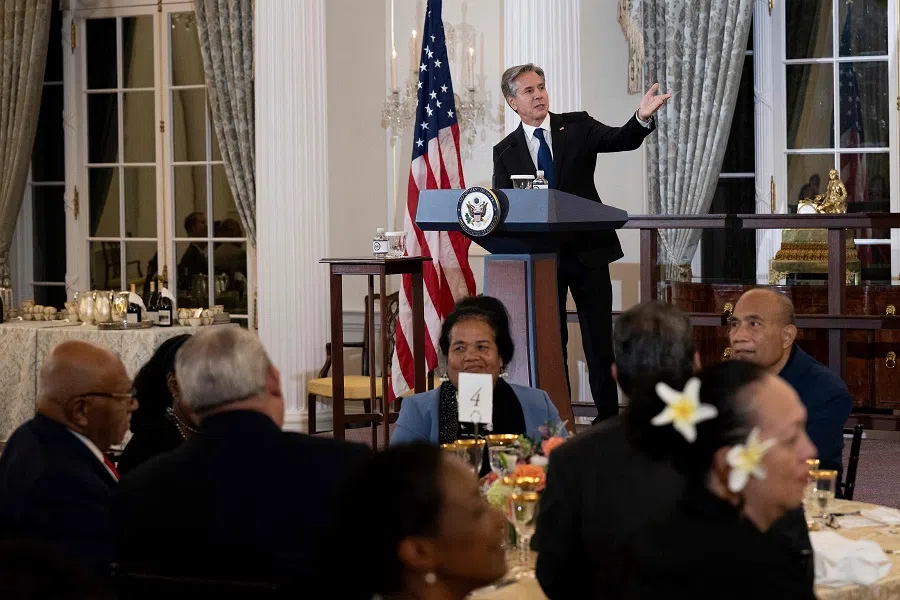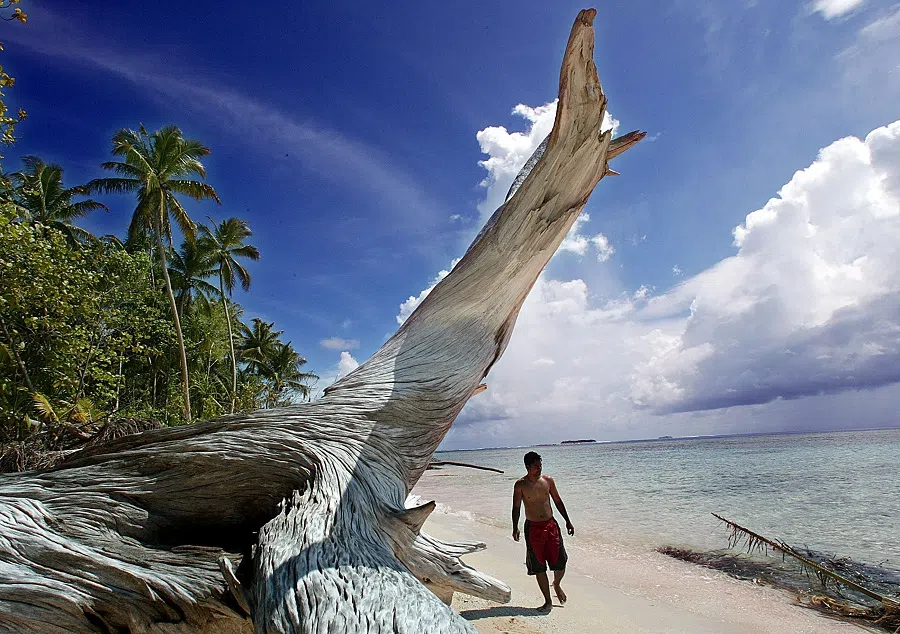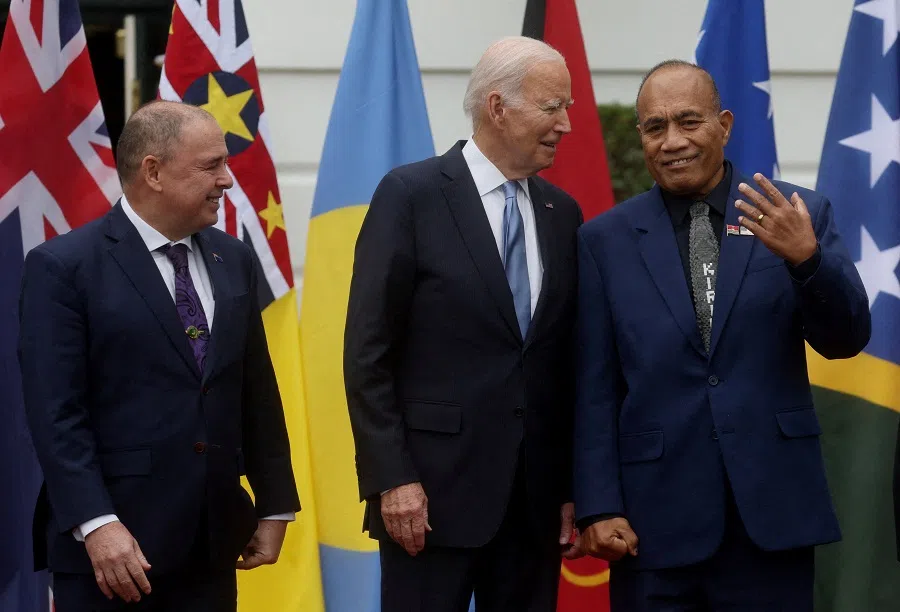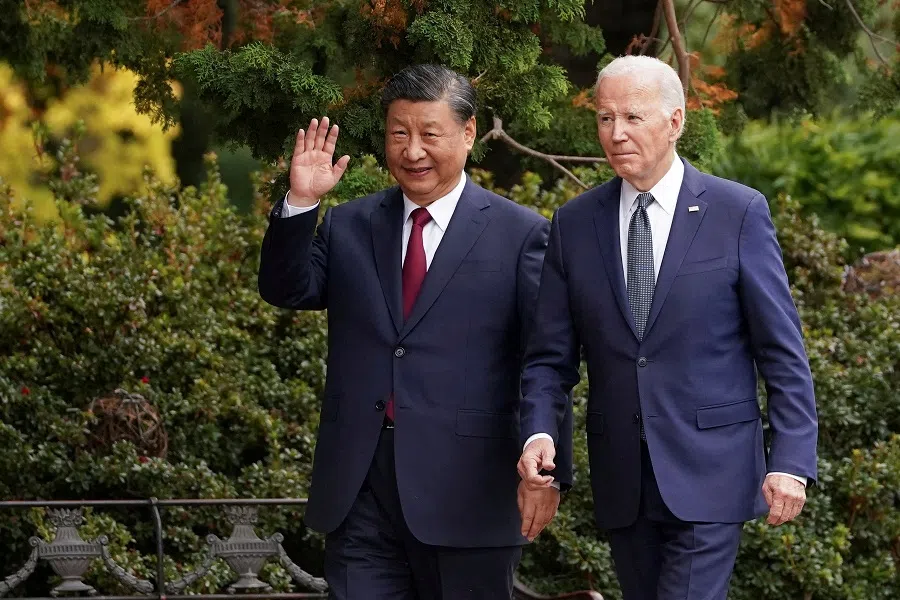Geopolitical tug of war an opportunity for Pacific Island nations
Concerns about a stronger Chinese engagement - following the unexpected security pact between China and the Solomon Islands in 2022 - rattled the US and its regional allies, Australia and New Zealand, into stepping up their engagements with the Pacific Island countries. Not unexpectedly, these island countries now find themselves beneficiaries of the competition for geopolitical influence even as they try to avoid being drawn into it.

Pacific Island countries share similar challenges: effects of climate change, economic vulnerability, resource scarcity, lack of skills training and underdeveloped infrastructures. Their regional governing body, the Pacific Islands Forum (PIF), has become a strong advocate for climate change action - sometimes against resistance from its PIF member country, Australia.
In the US-China competition for geopolitical influence, the PIF had already rejected in 2019 the idea that Pacific countries had to choose between the two big powers. "Friends to all, enemy to none" is their popular slogan. The present Forum chair, Cook Islands Prime Minister Mark Brown, recently emphasised: "The Pacific is not a region of competition, but is a region of collaboration."
United against climate change
At its 52nd PIF Leaders Meeting in Rarotonga, Cook Islands, two weeks ago, PIF garnered support from among the 21 dialogue partner countries for its four-year-old 2050 Strategy for the Blue Pacific Continent. And 120 countries co-sponsored a United Nations General Assembly (UNGA) landmark resolution introduced by Vanuatu in March this year for an advisory opinion from the International Court of Justice on climate change-related obligations.
Two UN groups, the Alliance of Small Island States (AOSIS) together with the Small Island Developing Countries (SIDS), have become lobby champions against climate change. The present chair of AOSIS, Samoa's Prime Minister Fiame Mata'afa, has rallied UN member states for the upcoming COP-28 in Dubai to press for more progress on "loss and damage finance".
PIF countries have also demanded simplified access to climate financing, more investments in disaster risk reduction and early warning systems, and raised concerns about insufficient grants, inadequate funding for adaptation, and a lack of locally-led climate action initiatives.
Infrastructure financing, until recently the niche for China and Japan, has become the flavour of the day.

Pacific Island countries are leaders in the global fight against climate change. They have been pushing the global agenda on the ocean and climate change connection, and on climate justice.
Spiralling debt problem
According to the Lowy Aid Map, aid to the Pacific was up 47% during the Covid-19 crisis. The Asian Development Bank (ADB) had tripled its aid and became the biggest and Australia the second biggest development partner. But nowadays, almost half of the aid are concessional loans, not grants. Infrastructure financing, until recently the niche for China and Japan, has become the flavour of the day.
In 2021, the ADB provided 34% of all infrastructure loans, Australia 18%, China 15%, Japan 12%, World Bank 6% and the EU 4%. Pacific countries are now in a position to be choosy about their partners for much-needed infrastructure investments.
Unfortunately, this will also increase already precarious debt levels. According to a 2021 IMF report, six Pacific countries were at high risk of debt distress after the economic downturn during the Covid-19 pandemic. The three major creditors are the ADB, China and the World Bank.
China's strategic goals in the region
The Pacific Island region has long been important to China's geostrategic interests. China has pursued various goals in its engagement with the Pacific: seeking naval access to the region, achieving diplomatic victories against Taiwan, securing fishing and seabed mining rights in the vast economic zones of the Pacific States, and protecting its Chinese diaspora.
China's development assistance to the Pacific peaked in 2016 (US$287 million). In 2020, it was US$187 million, the lowest since 2008. This downward trend continued in 2021.

China has become the largest trading partner for most Pacific Island countries. It has invested in ten Pacific countries within the framework of its Belt and Road Initiative and built numerous large infrastructure projects which it financed by loans. These were projects which other countries or donor institutions were not able or not willing to finance.
China has also provided generous scholarship programmes and training facilities to a number of countries in the region and established six Confucius Institutes. Numerous high-level diplomatic visits, among them two visits by Chinese President Xi Jinping, have highlighted China's interest in the region as early as 2012.
Development financing and security agreements remain key diplomatic tools for China. According to last year's Lowy Institute Pacific aid analysis, China's development assistance to the Pacific peaked in 2016 (US$287 million). In 2020, it was US$187 million, the lowest since 2008. This downward trend continued in 2021. One of the reasons for this lies in the slowdown of the Chinese economy.
China's infrastructure financing now focuses mainly on two countries: Kiribati and the Solomons Islands. In 2019, these countries switched diplomatic recognition from Taiwan to China. China subsequently financed three major projects in the Solomon Islands: a Huawei telecommunications project, the upgrade of its major port and a sports stadium for the ongoing Pacific Games, a pet project of Prime Minister Manasseh Sogavare.
Recent US steps in the Pacific
In 2022, the Biden administration of the US kickstarted its rather dormant engagement with Pacific Island countries with a number of high-ranking political and military visits, among them that of Secretary of State Antony Blinken, the first visit of a US secretary of state in 40 years, and Vice-President Kamala Harris, who attended the PIF Leaders Meeting in July last year. President Joe Biden twice hosted PIF heads of government at a US-Pacific summit at the White House in November 2022 and in September this year. The US also announced the US-Pacific Partnership Strategy, a roadmap to strengthen cooperation with the Pacific.
After having reduced its aid to the Pacific in the years before, President Biden last year announced a US$810 million aid package, spread over 10 years, of which US$130 million was designated for climate change projects. The US government also pledged support in the control of illegal fishing, with the US Coast Guard assisting to strengthen local capabilities, especially in Papua New Guinea (PNG).
Fiji has become a focal point of the US's Pacific Islands strategy.

The US has had longstanding relations with its strategically important Compacts of Free Association (COFA) allies, Marshall Islands, Palau and the Federated States of Micronesia, which received the lion's share of US aid and investments in the Pacific. It recently signed an unprecedented package of US$7 billion over 20 years with the three countries, almost double the amount of the previous Compact package. The US hopes that they will remain US partners despite Chinese efforts to pull them into its orbit.
The US also increased its diplomatic presence in Pacific countries by reopening its embassy in the Solomon Islands after 30 years of absence, established diplomatic relations with the Cook Islands and Niue, and opened a USAID office in Fiji and embassies in Tonga, Kiribati and Vanuatu.
Fiji has become a focal point of the US's Pacific Islands strategy. Both countries strengthened security ties with a landmark Defence and Security Agreement in 2020. The US also pledged help in controlling illegal fishing. The US and Fiji have also concluded a Trade and Investment Treaty (TIFA). Fiji as the only Pacific Islands country also joined the 14-member US economic initiative Indo-Pacific Economic Framework (IPEF).
In tandem with the US, Australia and New Zealand have also intensified their longstanding relations with the Pacific, especially with Fiji, Vanuatu and PNG. Australia increased its aid to the Pacific, slightly improved its previously unambitious climate policy and pledged to work with Pacific Island countries on a more equal footing. However, Australia's recent and much-touted security agreement with Tuvalu, which also gives Australia veto power in Tuvalu's foreign and security affairs, seems to be an ominous sign for equal partnership cooperation with the Pacific.
Lack of trade agreements and access to the US market compares unfavourably to China which has become the leading trading partner for most Pacific countries.
Potential pitfalls
There could be potential pitfalls for the US re-engagement. US trade with the Pacific (except with the Compact states) remains minimal. Lack of trade agreements and access to the US market compares unfavourably to China which has become the leading trading partner for most Pacific countries.

The US as well as China are competing with many other players who have been active for a long time such as Australia, New Zealand, the Asian Development Bank, Japan, and the EU. Pacific countries have more choices as to their development partners.
Pacific countries fear being drawn into a potential regional conflict between the US and China. Memories of American and French nuclear tests in the Pacific and insufficient compensation for nuclear damage explain some negative reactions to the AUKUS partnership. There is concern about nuclear-propelled submarines in the South Pacific. Without careful consultations, this complex issue could create divisions between Pacific Island nations and AUKUS member countries.
The US and Australia need to check their domestic and international climate policies. Granting of drilling rights for US gas and oil explorations and approvals for Australian new coal projects as well as non-support of UN resolutions do not go down well with Pacific countries.
The US re-engagement with Pacific Island countries will not be judged by high-ranking visits or new embassies but by its willingness to address the Pacific Islands' major concern, i.e., climate crisis, to contribute towards sustainable development and to increase trade with the region. China will focus its diplomacy on a few selected countries, further increase its trade with the whole region and use some soft power. The geopolitical tug of war in its courtyard is an opportunity for Pacific Island nations. They will pragmatically pick the best development offers. Competition for influence in Oceania will increase.
This article was first published as a RSIS Commentary on 27 November 2023.





